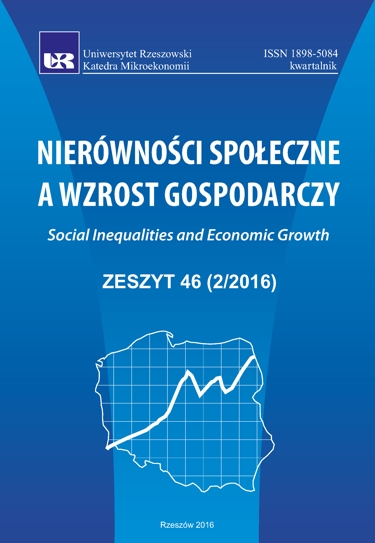The Significance of Institutional Arrangements for the Development of Human Capital and Success of Transformation Processes in Post-Socialist Countries
DOI:
https://doi.org/10.15584/nsawg.2016.2.2Keywords:
economic transformation, institutional changes, determinants of transformation, effects of transformationAbstract
This article aims to prove that the institutional order in a broad sense is essential for the success of transformation processes of post-socialist economies, especially for achieving positive social outcomes which contribute to the development of human capital. The analysis was conducted on the basis of an original model of the transformation process established by the author, using some examples of indica-tors illustrating the changes. The theoretical model assumptions were verified through a comparative study carried out for the group of countries of Central and Eastern Europe, which transformed their economic systems from central planning to market economy. Within the indicator analysis there have been included statistical data and indicators developed by several international institutions. It has been proved that there is no correlation between the technical, economic and social effects of transformation. The process of technical and infrastructure modernization often precedes positive effects in the econom-ic and social spheres. This is mainly due to the high level of investment in infrastructure, often financed from external resources (e.g. the European Union). In addition, societies of the post-socialist countries evaluate the processes occurring in the economy in a specific way (sometimes surprising). The percep-tion of “happiness” is not directly dependent on “hard” indicators reflecting the current condition of the economy. However, the transformation model presented in this article assumes that social factors have a significant influence on the dynamics of institutional changes therefore it can be expected that in countries where people positively assess the prosperity of the country, the dynamics of further develop-ment can exceed the countries with low levels of social satisfaction.Downloads
Download data is not yet available.
Downloads
Published
2020-11-10
How to Cite
Bąk, M. (2020). The Significance of Institutional Arrangements for the Development of Human Capital and Success of Transformation Processes in Post-Socialist Countries. Social Inequalities and Economic Growth, 2(46), 28–45. https://doi.org/10.15584/nsawg.2016.2.2
Issue
Section
Articles
License
Copyright (c) 2016 University of Rzeszow

This work is licensed under a Creative Commons Attribution-ShareAlike 4.0 International License.


